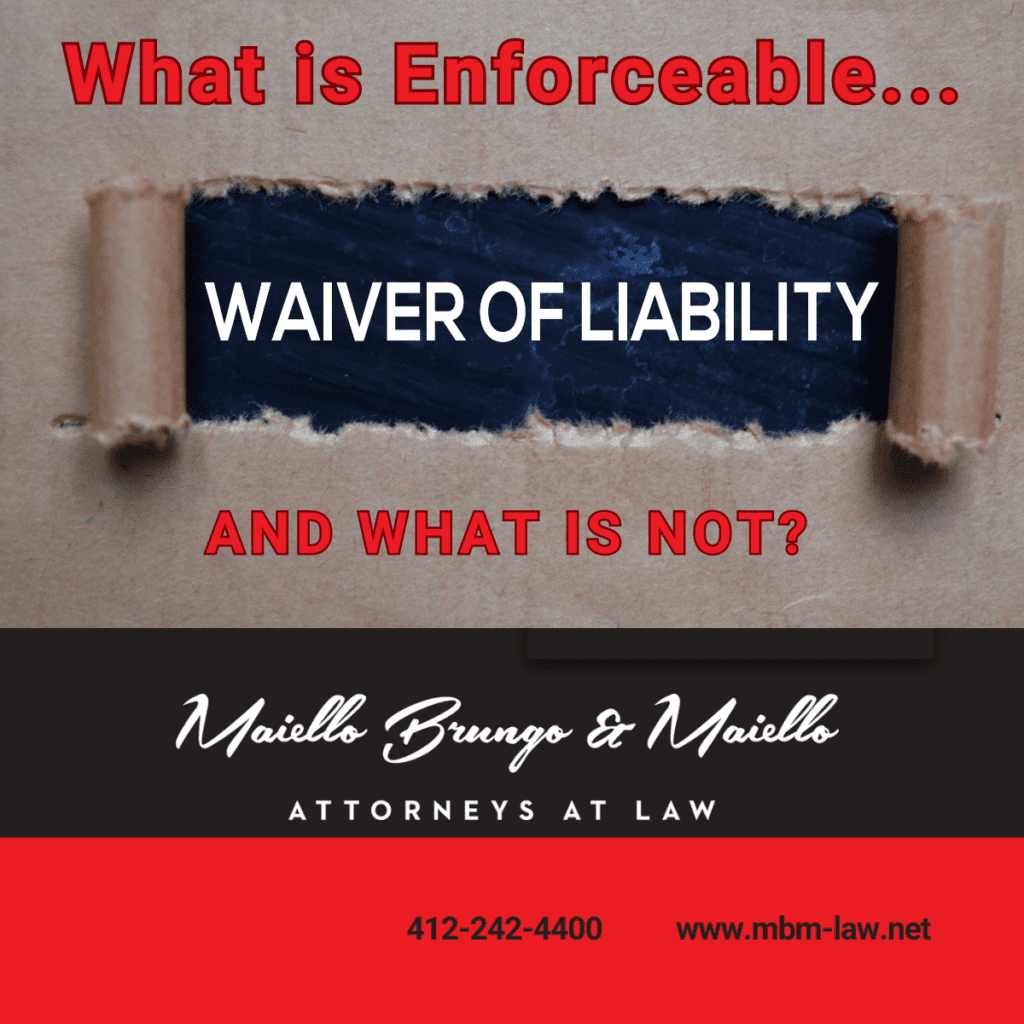Liability waivers can be crucial for businesses in Pennsylvania, but it’s essential to understand the legal complexities and ensure your waiver is tailored to your specific needs.
Need a legally sound liability waiver? MBM Law can help.
Get Liability Waiver Services in PA
Understanding Liability Waivers
A liability waiver is a contract that limits the liability of the company providing a service, or of a landowner leasing their land to a third party. A limitation of liability does not preclude a party from getting sued but can reduce the amount that the party may have to pay in the lawsuit, and in some cases can provide a party with the ability to recover attorneys’ fees.
Types of Liability Waivers
A liability waiver is sometimes called a release form, or a hold harmless agreement. These are some types of liability waivers that are common in Pennsylvania:
- Accident liability waivers
- Activity participation waivers
- Contractor liability waivers
- General liability waivers
- Mutual liability waivers
- Personal injury waivers
- Property liability waivers
Common Uses and Limitations of Liability Waivers
Liability waivers are commonly used for activities like golfing, gym memberships, or horseback riding, but can also be drafted for professional services and land use. Liability can only be limited as to negligence in Pennsylvania. Parties cannot agree to limit liability for gross negligence, or willful misconduct.
Liability waivers can help to protect businesses from damages claims and lawsuits, or limit the amount of civil damages that a plaintiff may claim in a lawsuit. Therefore, liability waivers help to shield a business’s bottom line and reputation.
The Legal Importance of Tailored Liability Waivers
If just one paragraph in the waiver is found to be unenforceable, a court may void the entire liability waiver, exposing the company to full liability. Each company has different types of liability exposures, and waivers should be specifically tailored to that company’s needs. Additionally, liability waivers can also serve the purpose of notifying a customer of the risks he or she may assume when participating in an activity. This is important because the liability waiver serves as evidence against a participant claiming that she was not aware of the risks of the activity or use. Although a liability waiver cannot wholly insulate a business from liability, it does shift the burden to the participant.
Some Special Considerations for Liability Waivers in PA
When signing waivers on behalf of children, make sure you understand the importance of being a guardian when it comes to the validity of the waiver being enforceable.
Protecting Your Business When Dealing with Minors
Under Pennsylvania law, natural parents who have not been appointed as guardians of their children, cannot sign a waiver binding their children to arbitration. In other words, if a parent signs a liability waiver for their children that requires the disputes to be arbitrated, or mediated, then that provision – or the entire waiver, may be found to be unenforceable.
Ensuring Valid Liability Waivers Involving Spouses in Pennsylvania
Pennsylvania appellate courts have held that spouses do not automatically have the authority to bind their spouses to liability waivers. Therefore, businesses are required to take additional steps to ensure that liability waivers are properly executed.
Pennsylvania Liability Waiver Services from MBM
The business attorneys at MBM can review liability waivers that a business currently has in place for compliance with Pennsylvania law, and revise those waivers as necessary. We can also draft, and specifically tailor, liability waivers to meet a business’ needs and provide the most protection that can be afforded to that business under Pennsylvania law.
Protect your Pennsylvania business with a legally sound liability waiver. Contact MBM today:


